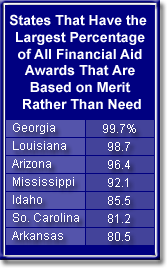



 States That Offer More Merit-Based Financial Aid Than Need-Based Awards
States That Offer More Merit-Based Financial Aid Than Need-Based Awards
Last week JBHE reported that financial aid to college students from the governments of the 50 states is increasingly being allocated on the basis of merit rather than need. Because college-bound black students frequently have lower high school grade point averages and score lower on standardized tests for college admission, blacks are placed at a severe disadvantage when competing for these merit-based scholarships.
 There are wide differences among the states in their allocation of financial aid for college students. In 2005 Utah, Rhode Island, and Wyoming were the only states where all their financial aid was based on need. These three states offer no scholarship aid based solely on merit. Five years ago, there were 14 states that offered only need-based aid.
There are wide differences among the states in their allocation of financial aid for college students. In 2005 Utah, Rhode Island, and Wyoming were the only states where all their financial aid was based on need. These three states offer no scholarship aid based solely on merit. Five years ago, there were 14 states that offered only need-based aid.
In some states the changeover from need-based aid to merit-based awards has been dramatic. For example, in 2005, after a new state lottery was instituted which funded college scholarships for all students meeting minimum state academic standards, the percentage of all aid in the state of Tennessee based on need dropped to 27.1 percent. In 2004 the percentage was 96.5 percent.
In 2005, 20 states — up from 12 in 2004 — offered more merit-based aid than need-based aid to undergraduate students. This is serious because many of these states are in the South where there are large numbers of low-income black students who need financial assistance in order to bear the costs of a college education.
![]()
Copyright © 2006. The Journal of Blacks in Higher Education. All rights reserved.